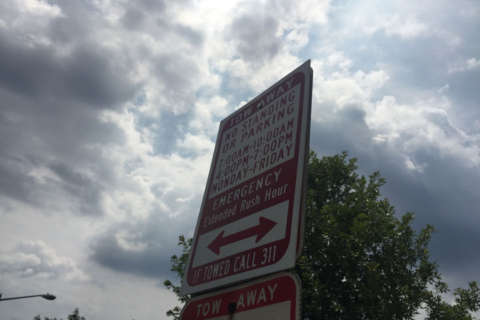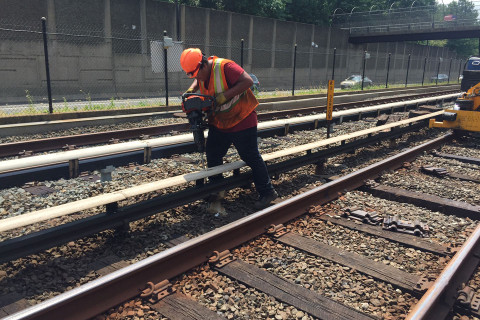WASHINGTON — Metro is raising fares Sunday for bus, rail and some paratransit riders.
Other local bus systems — such as the Fairfax Connector and Montgomery County’s Ride On, which generally keep fares in line with Metro — are mirroring the fare increases.
Here are seven things Metro riders need to know about the changes:
1. Rush-hour rail fares
Rush-hour rail fares rise by 10 cents each way starting Monday morning.
The rise to a minimum rush hour fare of $2.25 and a maximum of $6 is the first across-the-board fare increase since 2014.
Metro charges rush-hour fares to riders who enter the system before 9:30 a.m. or between 3 and 7 p.m. on weekdays.
2. Off-hour rail fares
Outside of rush hour, including on weekends and federal holidays, rail fares rise 25 cents per trip starting Sunday.
The minimum off-peak fare rises to $2, and the maximum fare outside of rush hour rises to $3.85.
There is no change to any of the rates added to the base fares based on the distance between the start and end stations. So the differences in the fare to different stations will remain the same.
3. Parking fees
Generally, daily parking fees at Metro garages will rise by 10 cents starting Monday.
In Montgomery County, new parking rates range from $4.45 to $5.20. In Prince George’s County, rates range from $4.70 to $5.20, depending on the station.
In Virginia, Metro’s parking rate rises from the previous $4.85 to $4.95.
In the District, Metro is experimenting with lowering the parking rate at Anacostia by 15 cents to $4.45, while raising the rates at the Minnesota Avenue and Rhode Island Avenue stations by 35 cents to $4.95. As with garages elsewhere in the system, the rate at Deanwood will increase by 10 cents to $4.70.
There are no changes to fees for reserved parking or meters, nor additional charges at some stations for people who park but don’t take the train.
(There is also no change to the rental rate for a Metro bike locker — $120 per year.)
Parking on weekends and holidays remains free.
4. Bus fares
Bus fares jump by a much higher percentage than rush-hour rail fares.
Regular and express bus fares increase by 25 cents to $2 and $4.25, respectively.
The fares for the airport express bus routes that serve BWI-Marshall Airport (B30) and Dulles Airport (5A) increase by 50 cents, to $7.50.
Service is also being reduced on those two routes.
5. Monthly and weekly passes could save you money
The weekly bus pass will remain $17.50, providing a savings for the first time for even riders who only take 10 trips per week. On express buses, riders with the weekly regional bus pass only pay the fare difference between the two buses ($2).
For rail riders, Metro is continuing the SelectPass program, which offers a monthly rate equivalent to 18 round trips.
For example, to cover trips up to $2.25, a rider would pay $81 per month, or to cover trips up to $3.75, a rider would pay $135 per month.
For any fares over the amount covered by the pass, riders only pay the difference. In addition, SelectPass users can add unlimited regular bus trips for $54 per month.
Riders who take the bus to and from the train for longer trips once in a while could consider the new $14.75 one-day combined rail and bus pass (a 25-cent increase over the previous one-day rail-only pass). The pass will save riders who are taking two rush-hour trips that will cost the maximum $6 fare plus two or more bus rides during the day.
Other pass options include the $38.50 seven-day short-trip rail pass (valid for trips that cost up to $3.85) and the $60 seven-day fast pass (valid for unlimited rail trips of any price for seven consecutive days).
The cost of adding unlimited Metro rides to monthly TransitLink Card passes for MARC and VRE increases by $3 to $114.
6. Senior, disabled and paratransit fares
Seniors and those with certain disabilities continue to qualify to pay discounted fares on the rail and bus system.
All discounted rail rides are charged at half the peak fare, so these riders will pay 5 cents more for each rail trip.
On regular bus routes, seniors and people with disabilities will pay $1, an increase of 15 cents. On express buses, seniors and people with disabilities will pay $2.10, an increase of 10 cents.
For paratransit riders, while the maximum fare of $6.50 remains the same for MetroAccess service, a number of riders will pay more.
MetroAccess fares are twice the regular fare for a similar trip, so riders who had been charged $3.50 for a trip that was comparable to existing bus routes will now be charged $4.
7. Fare hikes come as Metro cuts hours and cuts scheduled rush-hour service
As the fare hikes begin, Metro is also cutting the rail system’s hours and reducing scheduled rush-hour service.
- Five things to know about Metro’s cuts to rush-hour service and bus routes
- Six things to know about Metro’s new hours







